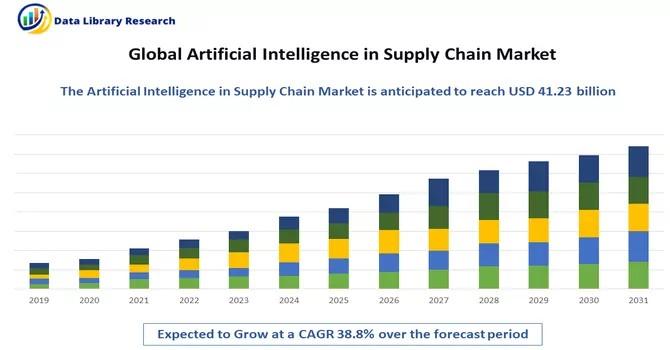Artificial Intelligence in Supply Chain Market will reach at

The AI in Supply Chain Market is projected to reach $41.23 billion by 2030, at a CAGR of 38.8% during the forecast period.
The detailed Artificial Intelligence in Supply Chain Market research report is just idyllic to discover about the Internet & Communication industry’s trends and opportunities. Every aspect of the report right from the market forecast, market analysis, estimations, and evaluations conducted in the report are made using popular tried and tested techniques and tools like Porter’s Five Forces analysis and SWOT analysis. These tools are authentic and reliable used largely in market analysis on which businesses can rely confidently. The global report brings into limelight several factors like the market conditions in general, market inclinations, market trends, regional overview, market opportunities, industry players, and segmentation, which all supports in taking business towards higher growth and success.
The report comprises a detailed segmentation, methodical overview of prominent market players, supply chain dynamics, consumer trends, and insights into new geographical markets. Analysis and research about the market’s key developments, detailed competitor analysis, and major competitors highlighted in the report aids businesses imagine a bigger picture both of the market and the goods that finally aids to define superior business strategies. The team at Data Library Research is focused to understand the businesses of the client and their requirements so as to present them with a market research that is top notch. This is a unique, highly pertinent, and commendable report framed by laying emphasis on definite business needs.
Top Key Players:
• Intel Corporation (U.S.)
• Microsoft Corporation (U.S.)
• Amazon Web Services, Inc. (U.S.)
• Google LLC (U.S.)
• NVIDIA Corporation (U.S.)
• Oracle Corporation (U.S.)
• IBM Corporation (U.S.)
• C3.ai, Inc. (U.S.)
• SAP SE (Germany)
• Samsung SDS CO., Ltd. (South Korea)
• Coupa Software Inc. (U.S.)
• Micron Technology, Inc. (U.S.)
• Advanced Micro Devices, Inc. (U.S.)
• General Electric Company (U.S.)
• FedEx Corporation (U.S.)
• Deutsche Post DHL Group (Germany)
Read the Detailed Index of the Full Research Study @ https://www.datalibraryresearch.com/market-analysis/artificial-intelligence-in-supply-chain-market-4925
The Global Artificial Intelligence in Supply Chain Market segmented by company, region (country), by Type, and by Application. Players, stakeholders, and other participants in the global Artificial Intelligence in Supply Chain Market will be able to gain the upper hand as they use the report as a powerful resource. The segmental analysis focuses on revenue and forecast by region (country), by Type, and by Application for the period 2023-2031.
Market Segmentation:
AI technologies are improving procurement processes by optimizing supplier selection, negotiation, and contract management. The use of AI-driven autonomous vehicles and drones for deliveries and transportation is on the rise. These technologies are expected to further optimize logistics and reduce delivery costs.
Market Segment by Regions, regional analysis covers
• North America (United States, Canada and Mexico)
• Europe (Germany, France, UK, Russia and Italy)
• Asia-Pacific (China, Japan, Korea, India and Southeast Asia)
• South America (Brazil, Argentina, Colombia, etc.)
• Middle East and Africa (Saudi Arabia, UAE, Egypt, Nigeria and South Africa)
Research objectives:
• To study and analyze the Global Artificial Intelligence in Supply Chain Market size by key regions/countries, product type and application, history data from 2018 to 2020, and forecast to 2031.
• To understand the structure of Artificial Intelligence in Supply Chain Market by identifying its various sub segments.
• Focuses on the key global Epigenetics players, to define, describe and analyze the value, market share, market competition landscape, SWOT analysis and development plans in next few years.
• To analyze the Epigenetics with respect to individual growth trends, future prospects, and their contribution to the total market.
• To share detailed information about the key factors influencing the growth of the market (growth potential, opportunities, drivers, industry-specific challenges and risks).
• To project the size of Epigenetics submarkets, with respect to key regions (along with their respective key countries).
• To analyze competitive developments such as expansions, agreements, new product launches and acquisitions in the market.
• To strategically profile the key players and comprehensively analyze their growth strategies.
• To strategically profile the key players and comprehensively analyze their growth strategies.
The report lists the major players in the regions and their respective market share on the basis of global revenue. It also explains their strategic moves in the past few years, investments in product innovation, and changes in leadership to stay ahead in the competition. This will give the reader an edge over others as a well-informed decision can be made looking at the holistic picture of the market.
Key questions answered in this report
• What will the market size be in 2031 and what will the growth rate be?
• What are the key market trends?
• What is driving this market?
• What are the challenges to market growth?
• Who are the key vendors in this market space?
• What are the market opportunities and threats faced by the key vendors?
• What are the strengths and weaknesses of the key vendors?
Table of Contents: Artificial Intelligence in Supply Chain Market
• Part 1: Overview of Artificial Intelligence in Supply Chain Market
• Part 2: Epigenetics Carts: Global Market Status and Forecast by Regions
• Part 3: Global Market Status and Forecast by Types
• Part 4: Global Market Status and Forecast by Downstream Industry
• Part 5: Market Driving Factor Analysis
• Part 6: Market Competition Status by Major Manufacturers
• Part 7: Major Manufacturers Introduction and Market Data
• Part 8: Upstream and Downstream Market Analysis
• Part 9: Cost and Gross Margin Analysis
• Part 10: Marketing Status Analysis
• Part 11: Market Report Conclusion
• Part 12: Epigenetics: Research Methodology and Reference
Browse More Reports:
• https://hackmd.io/@pranju/B15Ng-qQA
• https://hackmd.io/@pranju/Hy1vWWqXC
• https://hackmd.io/@pranju/B1WlE-cXR
• https://hackmd.io/@pranju/BJJvHWqmC
• https://hackmd.io/@pranju/SkQ1vWcmA
Contact Us:
Rohit Shrivas,
Senior Manager International Sales and Marketing
Data Library Research
info@datalibraryresearch.com
Ph: +1 (480) 529-6635 (US)
About Us:
Data Library Research is a market research company that helps to find its passion for helping brands grow, discover, and transform. We want our clients to make wholehearted and long-term business decisions. Data Library Research is committed to delivering its output from market research studies that are based on fact-based and relevant research across the globe. We offer premier market research services that cover all industries verticals, including agro-space defense, agriculture, and food, automotive, basic material, consumer, energy, life science, manufacturing, service, telecom, education, security, technology. We make sure that we make an honest attempt to provide clients an objective strategic insight, which will ultimately result in excellent outcomes.
This release was published on openPR.



